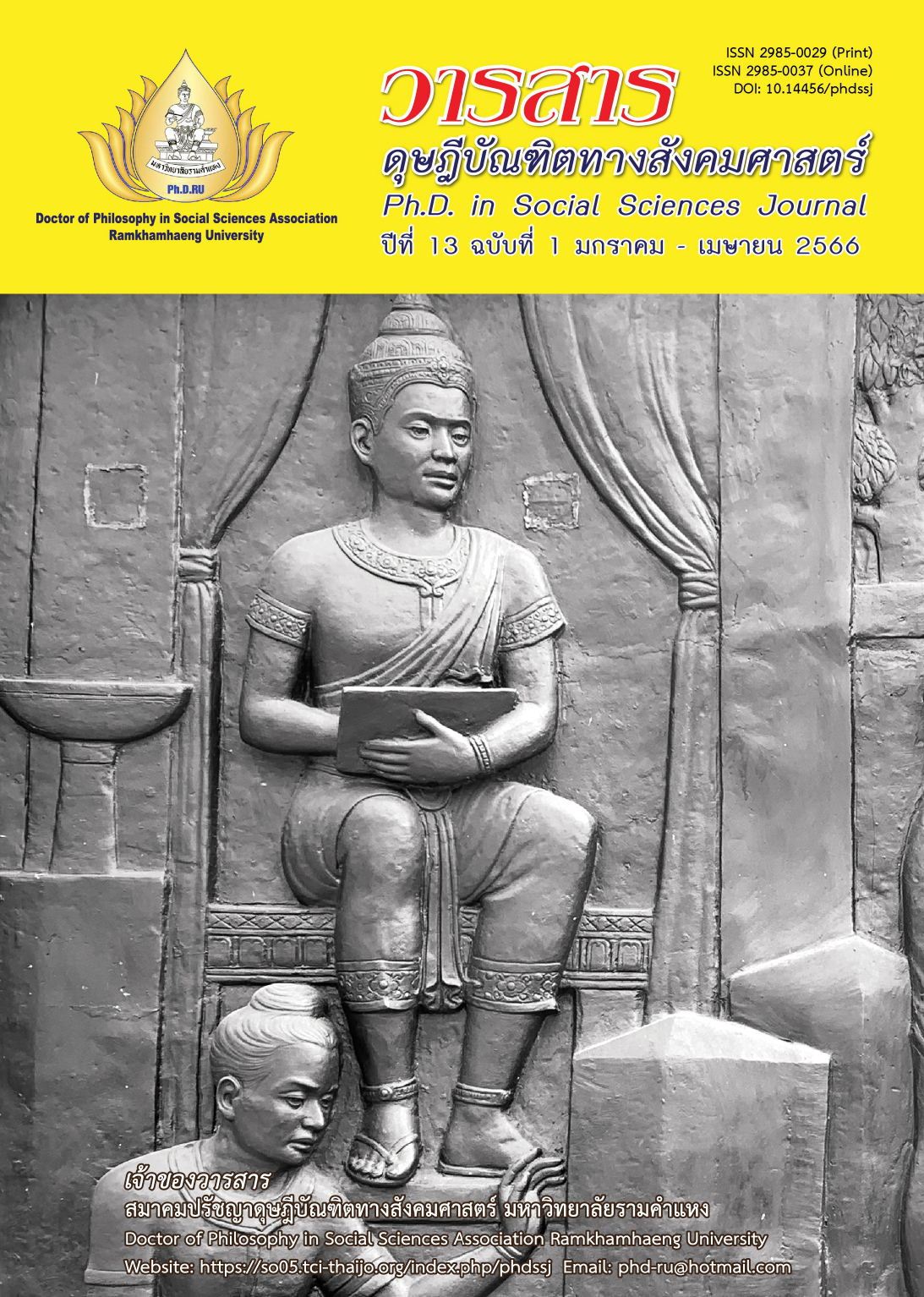Urban Management that is Friendly to the Elderly in Bangkok Area: Participation is the Heart, the Finish Line is the Elderly
Main Article Content
Abstract
This academic paper aims to (1) analyze the situation of entering the world’s aging society in Thailand. (2) to analyze the problems of elderly-friendly city management and (3) to present guidelines for elderly-friendly city management in Bangkok by bringing the concept of the elderly elderly-friendly city and policies and cabinet resolutions related to the aging society as a framework for analysis.
The analysis results of the analysis revealed that (1) Asia has the highest number of elderly people in the world, followed by Europe, while Africa is not an aging society. China has the highest elderly population in the world, followed by India, the United States, Indonesia, and Pakistan. Thailand has entered an aged society since 2005 and by 2021 it has entered an aged society completely. In the year 2032, it will fully enter an aging society. (2) The problem of managing a city that is friendly to the elderly is housing, participation in society, social acceptance, local involvement and employment, access to information and communication, community support and health services, external space and building conditions, and mass transit systems and (3) Guidelines for managing a city that is friendly to the elderly are adhere to the principle of participation, make the elderly the center of development and take lessons from success in managing an elderly-friendly city from other cities around the world to apply.
Article Details

This work is licensed under a Creative Commons Attribution-NonCommercial-NoDerivatives 4.0 International License.
Academic articles, research articles, and book reviews in the Ph.D. in Social Sciences Journal are author’s opinions, and not the publisher’s, and is not the responsibility of the Ph.D. in Social Sciences Journal Philosophy Association, Ramkhamhaeng University. (In the case that research is done on human, the researcher has to be trained in Ethics for Doing Research on Human Training and has to produce the evidence of the training).
References
Brown, P. (2014). Active aging: Roles of the aged groups and “capitals” utilized in elderly care Movement. Journal of Humanities and Social Sciences, 31(3), 97-120. [In Thai]
Foundation of Thai Gerontology Research and Development Institute. (2019). Situation of the Thai older persons 2019. Retrieved from https://thaitgri.org/?p=39387 [In Thai]
Intraratsamee et al. (2017). Cooperative learning between elderly people and care giver to develop inside and outside environment of the elderly people’s home within provinces under responsibility regional health promotion center 6. Ministry of Public Health, Department of Health, Regional Health Promotion Center 7, Khon Kaen.
Jampangern, S. (2016). Development guidelines for public park towards age friendly city in Bangkok. Master’s Thesis of Architecture, Thammasat University. [In Thai]
Jarutach, T. (2018). Age-friendly city. What does a friendly city look like for the elderly?. Retrieved from https://shorturl.asia/ZvRL5 [In Thai]
Klinchart, R. (2017). Nurse’s roles for participation in age-friendly community development. Journal of Phrapokklao Nursing College, 31(1), 189-197. [In Thai]
Kokpol, O. (2009). Your partner, public participation handbook for local administrators. Charansnitvong Printing. [In Thai]
Ministry of Social Development and Human Security, Department of older Persons. (2019). Measures to drive the national agenda on the aging society: Sustainable change. Author. [In Thai]
Ngamkham, S., Suwannapong, N., Tipayamongkholgul, M., & Manmee, J. (2018). Access to health services for the elderly in Taweewattana district. Kuakarun Journal of Nursing, 25(2), 91-104. [In Thai]
Office of the National Economic and Social Development Council. (2019). The number and rate of the elderly in the year 2008-2018. Author. [In Thai]
Bangkok Metropolitan Administration, Public Relations Office. (2022). Policies of the governor of Bangkok (Mr. Chatchat Sitthiphan). Retrieved from https://shorturl.asia/Orv7m [In Thai]
Office of the Public Sector Development Commission. (2017). Participatory public administration: Techniques and methods and putting it into practice. Author. [In Thai]
Peek, C., Im-em, W., & Tangthanaseth, R. (2015). The state of Thailand’s population report 2015: Features of Thai families in the era of low fertility and longevity. The United Nations Population Fund and National Economic and Social Development Board. [in Thai]
Plikamin, W., Intrawut, N., Boonnak, P., & Limmaneevijit, W. (2015). Organization of the care system and environment suitable for the elderly in an aging society. Economic and Social Journal, 52(3), 17-25. [In Thai]
Pornsiripongse, S., Boonrugsa, T., & Ruedeejamroen, S. (2007). Thai elderly...ageing with value and value Prestige. Journal of Language and Culture, 26(1-2), 132-142. [InThai]
Raweesangsoon, S. (2016). Guidelines for improving the quality of elderly care in Bangkok to support elderly society. National Defence College, National Defence Program. [In Thai]
Sirisamud et al. (2014). Review of benefits package and device service access assistive devices for people with disabilities. Public Health Systems Research Institute. [In Thai]
Sukhothai Thammathirat Open University. (2014). Aging society: Implications for economic development. Retrieved from https://www.stou.ac.th/stouonline/lom/data/sec/Lom12/05-01.html [In Thai]
Sukto, A. (2019). Travel patterns and public transport with the aging society. Retrieved from https://www.parliament.go.th/ewtadmin/ewt/parliament_parcy/download/article/article_20210423152404.pdf [In Thai]
Tayati, P., Disthaporn, C., & Onming, R. (2017). The model of Thai elderly learning management for information and communication technology literacy. Veridian E-Journal, Silpakorn University, 10(3), 1456-1471. [In Thai]
Thai Health Promotion Foundation. (2018). Age-friendly city: What do you look like?. Retrieved from https://www.thaihealth.or.th/age-friendly-city-เมืองเป็นมิตรผู้สูง [In Thai]
Tiraphat, S., Buntup, D., Suthisukon, K., Thamma-aphiphol, K., & Chinchotikasem, D. (2018). Developing age-friendly communities to strengthen active aging with appropriateness and sustainability: Phase 1- Defining the indicators of age-friendly communities. Mahidol University, ASEAN Institute for Health Development. [In Thai]
United Nations Population Fund. (2020). Ageing in the twenty-first century: A celebration and a challenge. Author. [In Thai]
Walker, A. (2018). How nurses can help create age-friendly communities. Retrieved from https://campaignforaction.org/nurses-can-help-create-age-friendly-communities
Wongseng, W., & Jadesadlug, V. (2015). The roles and participation of the elderly in civil society in community development Bangkhae disrict, Bangkok. Veridian E-Journal, Silpakorn University, 9(1), 1399-1415. [In Thai]
World Health Organization. (2022a). Active ageing: A policy framework. Author.
World Health Organization. (2022b). Ageing and health. Retrieved from https://www.who.int/news-room/fact-sheets/detail/ageing-and-health


